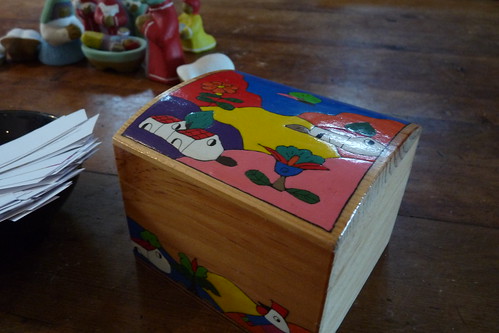In the crazy commercial times that can be Christmas, I love the symbolism of Advent. We’re Catholic, and in our tradition, Advent is a time of waiting and preparation. It’s a time of taking the light of the Advent candles into our hearts, and sharing that light with others.
A couple of years ago, in an attempt to make the purpose of Advent tangible to the kids, I came up with the idea of an Advent box. We talked about specific ways we might make ourselves light-filled people. What little acts could we do that might bring happiness to others? We decided to put slips of paper beside the box, and when any of us did something kind for someone else, we could secretly write it down and put it in the box.

At the end of Advent we would count the slips of paper in the box. We would give each a monetary value-I think we made them worth $1-and we would use the money we “raised” to buy an animal for a needy family through Heifer International.
Of course, we aren’t really raising money, so any money earned comes from the family account. But I like the idea of having our actions be the basis of our donation-and the kids are always able to pitch in some of their own money in the end, if they choose to.
If you read my last post, you’ll remember how I was touched by our friend Dave, and his positive attitude. How he didn’t begin his day of driving by complaining, as I think many of us might be inclined to, but instead he recognized the beauty in the morning.
I thought about that for the rest of my morning, and knew what I wanted to work on for Advent: I want to be a more positive person. I want to give up complaining.
I’ve reserved Complaint-Free World from the library. It hasn’t come yet, so I haven’t looked at it and don’t know much about it. Plus, I’m not really a self-help book kinda gal. But I figure it’s worth a skim. I’d like to get the author’s take on how complaining affects us.
But you don’t need a book to give up complaining. You just need to stop complaining. I’ve been trying for four days now, and it hasn’t been too hard. One morning as we tried to rush out the door, and I pointed out the mess that would be waiting on the kitchen table when we got home, Lulu said, “That’s complaining.” She was right. Typically I might have responded with a snarky, “I’ll mind my own complaining, thank you very much.” But crazy as it sounds, I appreciated having her point it out. Because I want to be a successful non-complainer.
It feels good not to complain! I think we believe that complaining releases frustrations and makes us feel better, but willingly refraining from complaining is an even better “feeling better”. That said, I haven’t had to work too hard to restrain my complaining the last four days. They’ve been an easy, positive few days. But have they been positive merely by chance? Or positive because I haven’t complained?
Either way, there are at least four more slips in the Advent box than there were on Sunday. And each says, “Today I tried hard not to complain.”

Each slip gets us closer to a chicken, or a goat, or a llama for a family somewhere in the world. A little light from our family to theirs.

Thank you for the link to that book — I think I could use some more positive acts too!
I love your advent tradition and your positive outlook. reminds me of ‘the power of positive thinking’ that i read awhile back. thanks for the reminder to put happiness and light out into the world! have a good weekend!
Beautiful box, and lovely idea. You’ve inspired me to try to give my kids a criticism-free December. A month of catching them in the act of doing good things.
In defense of complaining, from a long line of complainers — I’ve come to think of complaining as a symptom, not a syndrome. Treating the symptom may not help with the underlying disease. Aren’t we women historically very good at not complaining? When we complain, about, say, the domestic burdens we bear, or the responsibility of homeschooling our kids because the public schools don’t offer what we want — maybe we push for change.
That said, the Advent box is lovely. I love advent. Even when I am a complaining Grinch. 🙂
Thanks for stopping by the blog, Jennifer!
And thanks for helping me consider complaining from another angle. I see your point about women historically suffering in silence and not being able to do anything about it. I’m definitely not one to promote suffering in silence!
For myself, it isn’t that I want to keep my frustrations bottled up: I’m just trying to work on the semantics and the delivery. For example, instead of wandering through my kitchen muttering, “This place is such a mess. I wish everyone would pick up their stuff!” as I’m afraid I’m wont to do, I might say instead, in a kind, unmuttery voice, “Lulu, would you please take your pile of stuff upstairs this afternoon?” That turns a complaint into a respectful request. And guess what: the respectful request from the happy mom gets faster results than the muttered complaint!
That said, sometimes I *am* working on just keeping the frustrations inside. Do my kids need to hear me grumble at the car in front of me which is moving like a slug because the driver is talking on his cell phone? I don’t think so, but I grumble like that all the time. But since Advent I’ve been trying to keep it in check. And whenever I keep one of those comments inside, I feel good! Despite the slug in front of me! Or maybe even because of the slug in front of me! And again, my kids get a happier mom. Which is precisely the sort of light I’m trying to share.
It’s hard–I have a lot of Grinch in me too. But I’m really enjoying the challenge.